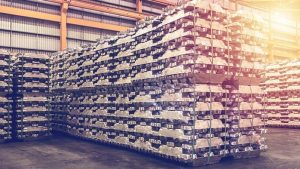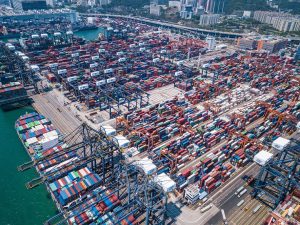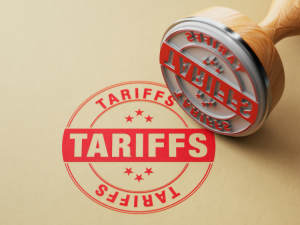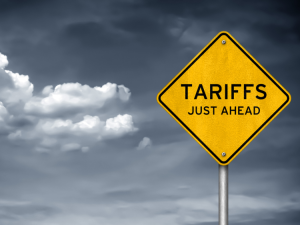CRU: Baosteel hints at output cuts in China
Baosteel exec comments on market rumors of 50 million tons of output being cut this year, less than 0.5% of the 1 billion tons-plus China has produced annually in recent years.
Baosteel exec comments on market rumors of 50 million tons of output being cut this year, less than 0.5% of the 1 billion tons-plus China has produced annually in recent years.
Given the news about tariffs and bringing back industries to the US, a brief look back in time may show how our economy changes with technological advances and the shifting economies of scale.

AMU’s Greg Wittbecker, an aluminum industry veteran, will address not only US tariffs but also evolving trade routes - and how supply chains are (or aren’t) adjusting. He’ll also touch on broader industrial impacts, from auto layoffs to the potential ripple effect of maritime tax policies.

We’ve talked about tariffs ad nauseam for much of the year. And I’m afraid this topic isn’t going away anytime soon. There’s a feeling that the tariff “can” will just be kicked down the road again and again, and again.

The tariffs are intended to produce more investment and jobs in US manufacturing. But first, there will be a cosmic change, potentially wiping out millions of jobs in the short run. While administration officials will no doubt cringe at the comparison, it reminds me of the effort to undercut fossil fuels production to address climate change. Led by Democrats, the effort was to destroy fossil fuels so that renewable energy sources would have more space to grow. The result: inflation and electoral defeat in 2024.
The US Commerce Department has set up an “inclusions process” to add derivative aluminum and steel articles within the scope of the new Section 232 tariffs.

With so much happening in the news cycle, we want to make it easier. Here are highlights of what’s happened and a few things to keep an eye on this upcoming week.

Brent Wilson talks about the different takes on President Trump's tariffs in Europe and the US.

Containers sailing from China in April are down 15%-20% and Hapag Lloyd says their future bookings transpacific are down 30%.
Can technology help with pig iron and DRI/HBI tariffs?
Activity had trended up for most of Q1
The facility at AMNS Calvert will be the first EAF in North America capable of supplying exposed automotive grades with domestically melted and poured material.
Nucor’s top exec Leon Topalian said the benefit of the current administration’s aggressive trade policies “trumps” any risk of potentially higher raw materials prices.

It's just the latest change for US trade policy

But profits slipped vs. last year.

President Trump cast a wide net with the proposed, reciprocal tariffs. The negotiating stage will be critical to determining the success of his strategy. And for those suffering tariff whiplash, don’t expect the pace of change to slow down just because the reciprocal tariffs are entering a negotiating phase.

Bilstein Cold Rolled Steel LLC CEO Brent Wilson will be the featured speaker on the next SMU Community Chat webinar on Wednesday, April 30, at 11 am ET. You can register here. Reminder: The live webinar is free to attend. A recording will be available only to SMU subscribers. About Bilstein and Wilson Bilstein Cold […]

The constant flow of information we all receive can be a bit overwhelming, but SMU is here to help with a weekly snapshot.
Chinese export prices for longs were almost steady this week, while those for flats generally declined as producers cut prices to secure deals.
Steel Dynamics' top exec thinks Trump’s tariff policies, as well as the results from the recent CORE case, will prove advantageous to the Fort Wayne, Ind.-based steelmaker and aluminum company.
Coil coater AZZ Inc. sees President Trump’s aggressive trade policy stoking demand for coating solutions for steel and aluminum made in the US.
Manufacturing was mixed, but two-thirds of districts said activity was little changed or had declined.
SMU’s Steel Demand Index has moved into contraction, according to late April indicators. The slowdown comes in response to growing tariff uncertainty after the index reached a four-year high in late February.
Earlier this week, SMU polled steel buyers on an array of topics, ranging from market prices, demand, and inventories to tariffs, imports, and evolving market events.

The company cited uncertainty about freight rates and demand, regulatory changes and the impact of tariffs.

Representatives from bulk commodity shippers and consumer goods argued against the fees, saying it could cripple supply chains because of the very dominance that China has in the existing shipping fleet.

Meanwhile, an increasing number think it's too early to say whether the penalties are going to bring more manufacturing to the US.

Operational results painted a picture of a company that produced more aluminum but shipped less of it as a result of tariffs and timing mismatches.
The union is also urging stronger enforcement against countries such as China which break trade rules, and a coordinated Canada-US strategy to protect union jobs across the North America

Should foreign investment be allowed to reshape the American steel Industry? Not to be lost in the recent on-again-off-again tariff frenzy, Nippon Steel’s proposed takeover of U.S. Steel has also found itself in President Trump’s crosshairs when it comes to trade and industrial policy. Nippon Steel initially announced its nearly $15-billion bid for U.S. Steel […]